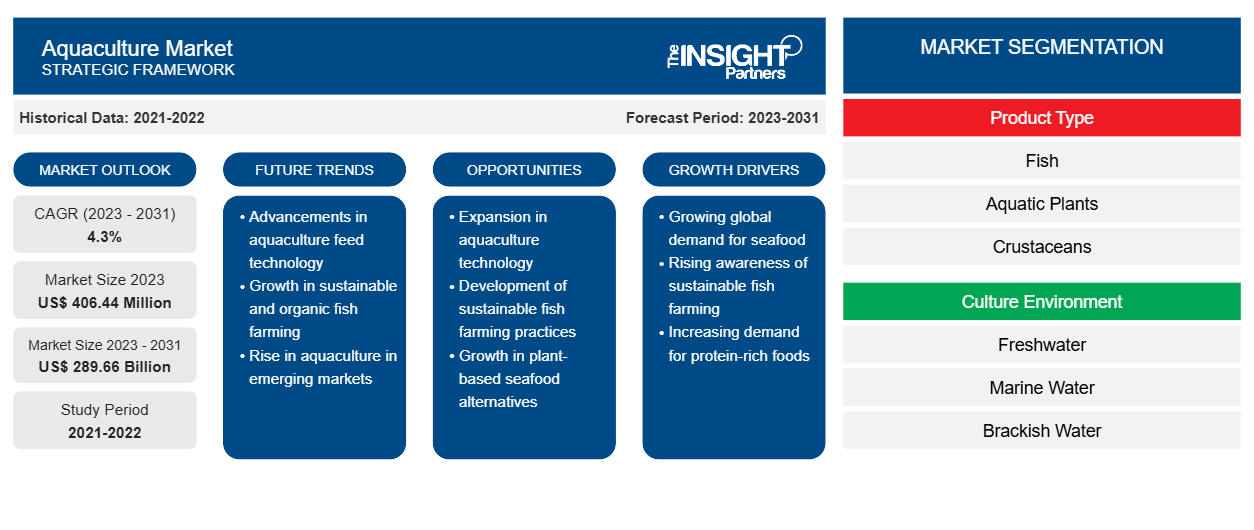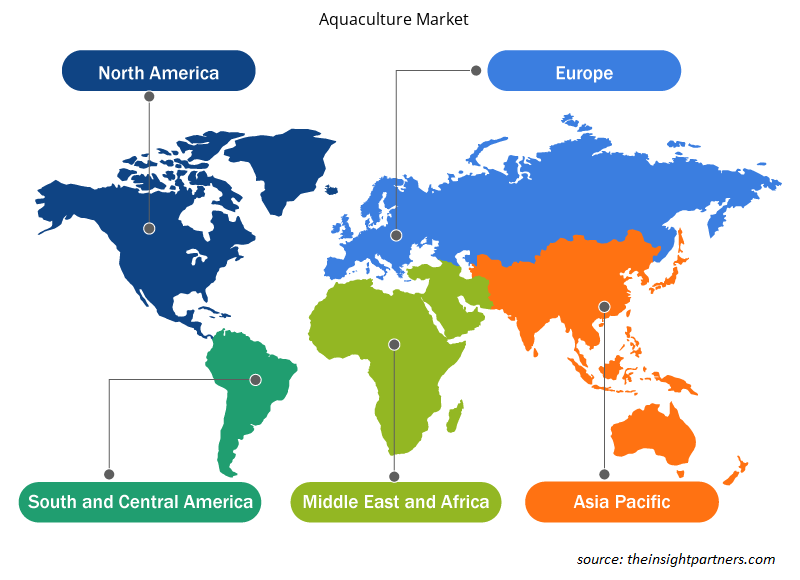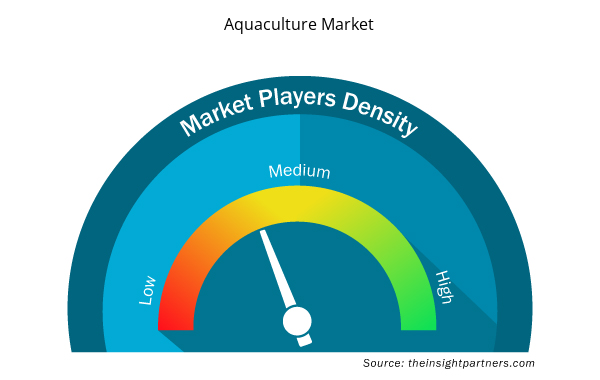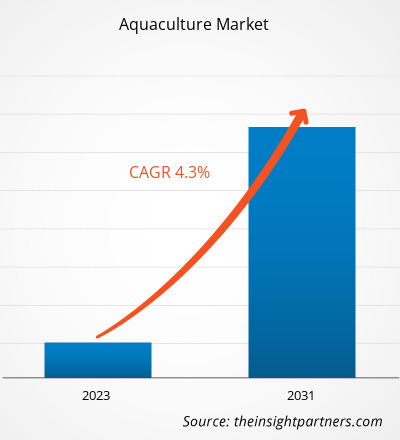The Aquaculture Market size is projected to reach US$ 289.66 billion by 2031 from US$ 406.44 million in 2023. The market is expected to register a CAGR of 4.3% in 2023–2031. The growing implementation of Recirculating Aquaculture Systems (RAS) technology across the globe farming of fishes and other aquatic species by reusing the water is likely to remain key aquaculture market trends.
Aquaculture Market Analysis
The Food and Agriculture Organization of the United Nations (UN FAO) has acknowledged a gap between seafood supply and demand for the future. It is forecasted that the demand for seafood by 2030 will exceed 260 million tons and the estimated supply by the current production rate will be 210 million tons. Thus, aquaculture is considered a capable source to meet the increased demand for seafood. Also, there are few certifications and standards associated with the seafood production for the sustainable environment. The World Wildlife Fund for Nature (WWF) and the Dutch Sustainable Trade Initiative (IDH) have come up with the Aquaculture Stewardship Council (ASC) which was initiated in the year 2010. The goal of this council is to transform the world’s seafood markets to promote social aquaculture performance.
Aquaculture Market Overview
Aquaculture includes farming of fish, aquatic plants, algae, crustaceans, molluscs, and other aquatic organisms. Small-scale aquaculture markets in developed and developing countries make critical contributions to employment. According to the Food and Agriculture Organization (FAO), aquaculture provides employment to more than 41 million people globally. The fish production constitutes majority of aquaculture activities in developing countries owing to the rising demand for seafood. Fish and other seafood species constitute an important source of nutrients for the people below poverty line and are amongst the cheapest form of animal protein. Aquaculture is considered as an important sector to meet rising fish demand, which will continue to increase with population growth, rising incomes, and increasing urbanization.
Customize This Report To Suit Your Requirement
You will get customization on any report - free of charge - including parts of this report, or country-level analysis, Excel Data pack, as well as avail great offers and discounts for start-ups & universities
Aquaculture Market: Strategic Insights

- Get Top Key Market Trends of this report.This FREE sample will include data analysis, ranging from market trends to estimates and forecasts.
Customize This Report To Suit Your Requirement
You will get customization on any report - free of charge - including parts of this report, or country-level analysis, Excel Data pack, as well as avail great offers and discounts for start-ups & universities
Aquaculture Market: Strategic Insights

- Get Top Key Market Trends of this report.This FREE sample will include data analysis, ranging from market trends to estimates and forecasts.
Aquaculture Market Drivers and Opportunities
Surge in Demand and Consumption of Seafood to Drive Market
Seafood, specifically fish is the part of traditional food in many regions. Also, fish is largely consumed owing to its nutritional benefits and several health benefits. It is considered as a good source of fatty acids, vitamins, minerals, protein, and essential micronutrients. Increase in disposable income and spending power of consumer also upsurge their spending on animal proteins such as seafood as compared to other food categories. Currently, high growth in population and increased popularity of seafood as a healthy source of protein have fuelled the growth of aquaculture market.
Application of Fish Oil in Several Industries – An Opportunity in Aquaculture Market
Aquaculture is an efficient method for fish production, which is ecologically effective and requires less costs as these ventures can be operated at large as well as small-scale. The high growth in demand for fish oil is generating a need for more fish production, thus, boosting the demand for aquaculture in the near future. Fish oil is largely used as a dietary supplement, healthcare, pharmaceutical, and food industry. It is an efficient source of vitamin A and D and is considered the most significant vitamin source for human consumption after wild fish.
Aquaculture Market Report Segmentation Analysis
Key segments that contributed to the derivation of the aquaculture market analysis are type and application.
- In terms of product type, the market is bifurcated into fish, aquatic plants, crustaceans, molluscs, and others. The fish segment dominated the market in 2023.
- Based on culture environment, the aquaculture market is divided into freshwater, marine water, and brackish water. Marine segment held a larger market share in 2023.
Aquaculture Market Share Analysis by Geography
The geographic scope of the aquaculture market report is mainly divided into five regions: North America, Asia Pacific, Europe, Middle East & Africa, and South America/South & Central America.
The Asia Pacific aquaculture market has experienced a huge shift over the years. The production and consumption rate of seafood is expanding rapidly with China and India being the major markets for the aquaculture industry. The Asia Pacific has evolved as the largest consumers and exporter of aquaculture products. Fisheries and aquaculture production are one of the major sectors contributing significantly to the economic growth of Asia-Pacific countries. However, the economic contribution of aquaculture production is less in the South and the Southeast Asian states. Seafood products are among the most traded commodities in the Asia Pacific region that bring valuable foreign exchange earnings in this region. Over the past few years, developing countries such as India and Thailand have become net exporters of fish, and a similar trend is projected to boost the aquaculture market in Asia Pacific over the coming years.
Aquaculture Market Regional Insights
The regional trends and factors influencing the Aquaculture Market throughout the forecast period have been thoroughly explained by the analysts at Insight Partners. This section also discusses Aquaculture Market segments and geography across North America, Europe, Asia Pacific, Middle East and Africa, and South and Central America.

- Get the Regional Specific Data for Aquaculture Market
Aquaculture Market Report Scope
| Report Attribute | Details |
|---|---|
| Market size in 2023 | US$ 406.44 Million |
| Market Size by 2031 | US$ 289.66 Billion |
| Global CAGR (2023 - 2031) | 4.3% |
| Historical Data | 2021-2022 |
| Forecast period | 2023-2031 |
| Segments Covered |
By Product Type
|
| Regions and Countries Covered | North America
|
| Market leaders and key company profiles |
Aquaculture Market Players Density: Understanding Its Impact on Business Dynamics
The Aquaculture Market market is growing rapidly, driven by increasing end-user demand due to factors such as evolving consumer preferences, technological advancements, and greater awareness of the product's benefits. As demand rises, businesses are expanding their offerings, innovating to meet consumer needs, and capitalizing on emerging trends, which further fuels market growth.
Market players density refers to the distribution of firms or companies operating within a particular market or industry. It indicates how many competitors (market players) are present in a given market space relative to its size or total market value.
Major Companies operating in the Aquaculture Market are:
- Bakkafrost
- Blue Ridge Aquaculture, Inc.
- Cermaq Group AS
- Cooke Aquaculture Inc
- Danish Salmon A/S
Disclaimer: The companies listed above are not ranked in any particular order.

- Get the Aquaculture Market top key players overview
Aquaculture Market News and Recent Developments
The aquaculture market is evaluated by gathering qualitative and quantitative data post primary and secondary research, which includes important corporate publications, association data, and databases. The following is a list of developments in the market for innovations, business expansion and strategies:
- In June 2021, JBS S.A. announced an agreement to acquire 100% of Huon Aquaculture, Australia's second-largest salmon producer. This is a strategic acquisition, which marks the entry of JBS into the aquaculture business. (Source: JBS S.A., Press Release)
- In Jan 2022, With the acquisition of Munkebo Seafood, Bakkafrost can now offer a wider range of products. Bakkafrost offers fresh, frozen, and smoked salmon products, and now canned food is added. Bakkafrost has a global sales network, and Munkebo Seafood’s products will now be offered in a wider market as a supplement to Bakkafrost's other consumer packaged products. (Source: Bakkafrost, Newsletter)
Aquaculture Market Report Coverage and Deliverables
The “Aquaculture Market Size and Forecast (2023–2031)” report provides a detailed analysis of the market covering below areas:
- Market size and forecast at global, regional, and country levels for all the key market segments covered under the scope
- Market dynamics such as drivers, restraints, and key opportunities
- Key future trends
- Detailed PEST/Porter’s Five Forces and SWOT analysis
- Global and regional market analysis covering key market trends, major players, regulations, and recent market developments
- Industry landscape and competition analysis covering market concentration, heat map analysis, prominent players, and recent developments
- Detailed company profiles
- Historical Analysis (2 Years), Base Year, Forecast (7 Years) with CAGR
- PEST and SWOT Analysis
- Market Size Value / Volume - Global, Regional, Country
- Industry and Competitive Landscape
- Excel Dataset



Report Coverage
Revenue forecast, Company Analysis, Industry landscape, Growth factors, and Trends

Segment Covered
Species , Nature , Culture Environment , and Geography

Regional Scope
North America, Europe, Asia Pacific, Middle East & Africa, South & Central America

Country Scope
Argentina, Australia, Brazil, Canada, China, France, Germany, India, Italy, Japan, Mexico, Russian Federation, Saudi Arabia, South Africa, South Korea, United Arab Emirates, United Kingdom, United States

 Get Free Sample For
Get Free Sample For